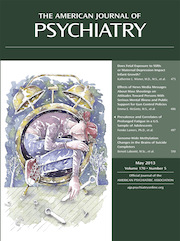Generalized anxiety disorder is by no means uncommon and often protean; it frequently appears as a complication of medical illness or in association with major depression and other mood disorders. With reported prevalence in the range of 2%–6%, patients with generalized anxiety disorder report levels of disability comparable to or greater than levels reported by patients with serious physical and mental disorders (including depression, arthritis, asthma, and diabetes) (
1). Distinguishing generalized anxiety disorder from normal worry is a clinical challenge; patients tend not to self-identify. Given the importance of the disorder, there is certainly need for a simple, straightforward guide for both primary care providers as well as for early-career clinicians and other psychiatric practitioners.
This fact-filled monograph is part of the Oxford Psychiatry Library series. Written by two distinguished experts in the field, Michael Van Ameringen and Mark Pollack, it offers a thorough overview of the subject. Topics covered include diagnosis, neurobiology, clinical features, pharmaco- and psychotherapy, clinical management, and self-help resources. Its sleek, slim exterior, similar in size to a Zagat Survey and with color reminiscent of a Michelin Guide, promises an experience of a handy guide to a complex subject. Unfortunately, its interior is surprisingly difficult to navigate.
This volume does pack in a great deal of information (partly through the use of a petit 7-point typeface font). The chapter on diagnosis is a detailed discussion of the history of the classification of anxiety and the complex debates around DSM-5. Its summary of neurobiology contains an excellent overview of current imaging and neurochemical literature. The section on pharmacotherapy contains a comprehensive review of efficacy data, including the melatonergic agent agomelatine, not currently available in the United States. It features a six-page table listing many of the relevant randomized trials. The chapter on psychotherapy offers a summary description of three cognitive-behavioral therapy approaches and 15 different techniques. This book turns out to be a highly technical, academically oriented manual for practitioners already well versed in the field.
Where it falls short is being a “user-friendly overview” for the young professional or generalist, as its blurb promises. Its many clinical pearls are often buried in the midst of long paragraphs full of technical details. It includes an extensive discussion of the variety of treatment approaches without a clear set of recommendations for choosing between them. There is but one treatment algorithm, which lacks specificity (e.g., it does not provide a decision tool for choosing whether to begin treatment with psychotherapy, pharmacotherapy, or both).
There are three omissions of particular note. Although there is good evidence of the efficacy of the anticonvulsant pregabalin for generalized anxiety disorder, at present the Food and Drug Administration has not approved pregabalin for this indication. This fact is mentioned in passing in chapter 5 (titled “Pharmacotherapy”); however, in chapter 7 (titled “Clinical Management”), pregabalin is included in a list of “first-line treatments” with no mention of this proviso. The chapter on psychotherapy does not include any discussion of evidence-based psychodynamic approaches (although the book does acknowledge Freud as one of the first to describe the disorder). An appendix including several useful rating scales omits scoring instructions or norms for all but one. The authors are to be commended for fitting so much information into a small package, but this volume does not fulfill its promise of being a useful guide for those travelers with little prior knowledge of anxiety’s multifarious domain.

